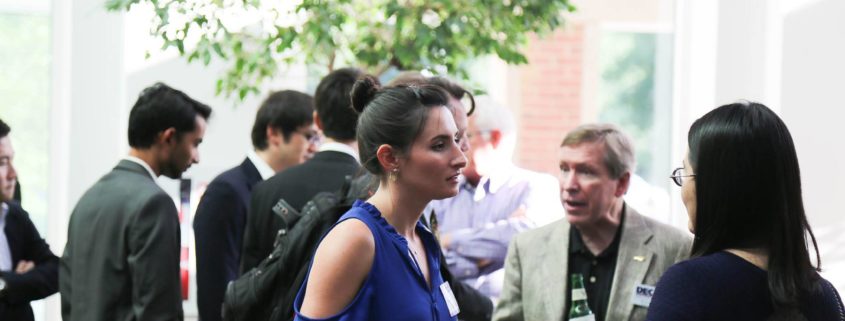International Law & Practice Section Reception with LL.M. Students
For the past several years, members of the International Law and Practice Section have enjoyed meeting international Master of Laws (LL.M.) students from North Carolina law schools at a reception hosted by the Section. In the beautiful setting of the Bar Center in early fall, members have connected with LL.M.s such as
- Young lawyers from the Japanese law firm of Nishimura & Asahi, which hosted the Section members who went on the Section’s exchange visit to Japan;
- Students from Middle East and African countries where members’ companies are doing business; and
- Students from countries where members have lived, worked, or traveled.
The conversations have resulted in follow-up meetings and invitations to Thanksgiving meals and other activities that help students appreciate Southern hospitality. The reception has also resulted in many students joining the Section as student members.
Currently, three of the N.C. law schools have LL.M. programs for foreign-trained lawyers: Duke, University of North Carolina, and Wake Forest. Each school’s program is similar. The LL.M. program usually runs for one academic year. LL.M. students must have a first degree in law from their home country. They take one or two courses specifically for LL.M. students, covering an introduction to U.S. law and also U.S. legal research and writing. LL.M. students then select the rest of their courses from the J.D. course offerings and put together a program of study in which they concentrate on particular fields of law or diversify their training to include new fields and even interdisciplinary courses.
 Each school values the presence of LL.M. students because they add an immediate comparative law dimension to classes and extracurricular activities. Encouraged to participate in class discussions along with their J.D. classmates, LL.M. students give insights from their legal education in another system, and sometimes from extensive practice experience. This helps broaden the J.D. students’ education. In addition, the LL.M. graduates become part of each law school’s global alumni network. The value of business referrals and the pleasure of personal contacts around the globe benefit J.D. and LL.M. alumni alike.
Each school values the presence of LL.M. students because they add an immediate comparative law dimension to classes and extracurricular activities. Encouraged to participate in class discussions along with their J.D. classmates, LL.M. students give insights from their legal education in another system, and sometimes from extensive practice experience. This helps broaden the J.D. students’ education. In addition, the LL.M. graduates become part of each law school’s global alumni network. The value of business referrals and the pleasure of personal contacts around the globe benefit J.D. and LL.M. alumni alike.
The LL.M. students, in turn, value the degree because it advances their careers as international lawyers. Most will return to their home country and join firms or companies with transnational legal work. Some are judges, prosecutors, or government lawyers who will use their understanding of U.S. law to reform and adapt their countries’ laws to global standards. A few will remain in the U.S. to practice with U.S. firms or companies. Several states now allow LL.M. students to sit for their bar exams, most notably New York, which has benefitted from international lawyers licensed in the state who bring international business to its bar members.
 N.C. bar members who have questions about the law of other jurisdictions, need legal translation services, or are planning visits to other countries should keep LL.M. students in mind. They would be more than happy to offer advice and information. In fact, the law schools may have externship programs for these students. At Duke, for example, LL.M. students may receive academic credit for part-time internships in organizations and companies whose work connects with a Duke Law School course.
N.C. bar members who have questions about the law of other jurisdictions, need legal translation services, or are planning visits to other countries should keep LL.M. students in mind. They would be more than happy to offer advice and information. In fact, the law schools may have externship programs for these students. At Duke, for example, LL.M. students may receive academic credit for part-time internships in organizations and companies whose work connects with a Duke Law School course.
For more information about the LL.M. programs and to discuss possible connections, please contact us directly:
Duke: Jennifer Maher, Associate Dean for International Studies, [email protected]
UNC: Beverly Sizemore, Director of International and LLM Programs, [email protected]
Wake: Amber Featherstone, Director of International Programs, [email protected]

